
Male Fertility and Sperm Health Awareness
When discussing fertility, much of the focus tends to be on women—but male fertility is just as crucial. In fact, male factors contribute to nearly 50% of infertility cases. Understanding sperm health and the factors that influence it can empower men to take proactive steps in their reproductive health journey.
Key Factors That Affect Male Fertility
Approximately 9% of men of reproductive age in the United States experience fertility challenges. While factors such as age and lifestyle habits play a role, many are unaware of the underlying science behind male fertility and how these key factors impact reproductive health.
-
Sperm Count: The total number of sperm in a semen sample. A healthy count is typically over 15 million per milliliter.
-
Sperm Motility: The ability of sperm to move efficiently to fertilize an egg. At least 40% motility is ideal.
-
Sperm Morphology: The shape and structure of sperm—abnormal shapes can impact fertility.
Lifestyle & Habits That Improve Sperm Health
In order to take care of your sperm, you must first take control of your lifestyle and habits that contribute to your overall health. Maintaining a balanced diet, which includes staying hydrated, and getting regular exercise are both beneficial to improving your health, thus improving your sperm’s health.
-
Balanced Diet: Antioxidants, omega-3s, and vitamin-rich foods support healthy sperm production.
-
Hydration: Staying well-hydrated helps improve semen volume and sperm movement.
-
Regular Exercise: Moderate physical activity boosts testosterone levels and overall reproductive function.
When to Get a Fertility Check-Up
While admitting to fertility challenges can feel daunting, many men may not recognize when it's time to seek professional help. If you've been trying to conceive without success, understanding when to consult a specialist can be the first step toward finding solutions. Men should consider a fertility evaluation—available through a consultation at Main Line Fertility—if they experience any of the following:
-
They’ve been trying to conceive for 12+ months without success.
-
They have a history of low testosterone, testicular injury, or surgery.
-
They experience low libido, erectile dysfunction, or changes in semen volume.
-
Their partner has undergone fertility testing and no issues were found.
Prioritizing Male Fertility: Your Next Steps
Male fertility is just as essential as female fertility when trying to conceive. The good news is that sperm health can often be improved through simple lifestyle changes or medical interventions like intrauterine insemination (IUI) or in vitro fertilization with intracytoplasmic sperm injection (IVF with ICSI), when needed. If you have any questions or concerns about your fertility, Main Line Fertility’s specialists are here to help. Schedule your consult.

